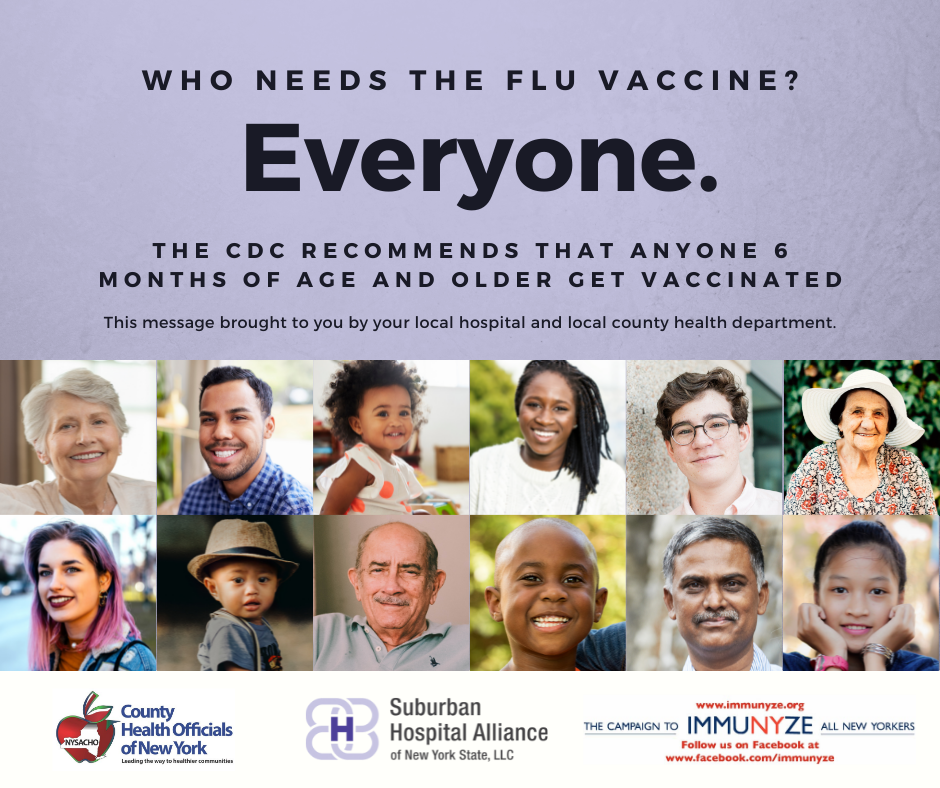December 5-11, 2021 is National Influenza Vaccination Week—read on to learn about the importance of the flu vaccine, now more than ever

According to the Centers for Disease Control and Prevention (CDC), influenza activity remains low nationally, but is slowly increasing. In fact, the number of influenza viruses detected by clinical and public health labs has increased in recent weeks. To help spread awareness and increase flu vaccine rates, the Suburban Hospital Alliance of New York State (SHANYS) and the New York State Association of County Health Officials (NYSACHO) have put together a flu vaccine social media campaign. The campaign aims to educate the community on the importance of the vaccine, and how and where to get vaccinated.
Who needs a flu vaccine? Everyone.
The CDC recommends that everyone over the age of 6 months old get vaccinated. There are different vaccinations for different groups of people. For instance, there are high dose flu vaccines designed for those ages 65 and older.
COVID-19 and the Flu
With COVID-19 posing an ongoing threat to public health, now is the time to get your flu vaccine if you have not done so already. Flu vaccines are safe, effective, and they can reduce your risk of getting seriously ill from the influenza virus. In 2020, experts said getting a flu vaccine was the first defense against a possible “twindemic,” due to a simultaneous spread of COVID and flu. While we’ve made great progress in the fight against COVID-19, the virus continues to mutate and spread, and experts’ advice remains the same: everyone eligible should get vaccinated against both flu and COVID to ensure continued good health and avoid a public health crisis.
If you have yet to receive either vaccination, consider getting vaccinated as soon as possible—the flu vaccine and COVID-19 vaccine can be given at the same time.
Chronic Diseases and the Flu
It is especially important for adults with chronic diseases to get vaccinated every year, as they are at high risk of developing flu complications. Many of these conditions also increase the risk for serious outcomes from COVID-19.
Asthma. Individuals who suffer from asthma are at increased risk for flu complications, even if their asthma is under control or if they take mediation. The flu can increase inflammation of the airways and lungs, trigger asthma attacks, and also lead to pneumonia and other respiratory diseases. Find out more about asthma and the flu.
Heart Disease & Stroke. The CDC reports that in recent flu seasons, about half of the adults hospitalized due to the flu suffered from heart disease. Flu illness is associated with increased heart attacks and strokes. Flu vaccination has been associated with lower rates of some cardiac events among people with heart disease, especially among those who had had a cardiac event in the past year. More on heart disease and the flu.
Diabetes. Individuals with type 1 diabetes, type 2 diabetes, or gestational diabetes are at an increased risk for flu complications even if their condition is well-managed. Because diabetes can weaken the immune system against fighting infections, the flu can increase risk for pneumonia, bronchitis and sinus infections. Blood sugar levels can be difficult to manage when sick, so the CDC recommends following sick day guidelines. Read more on the flu and people with diabetes.
Getting Vaccinated
Find flu vaccines at your local hospital or contact your local health department. Find flu vaccines and COVID-19 vaccines online at https://www.vaccines.gov/.
More Information
Check out these links for information about the flu virus and the flu vaccine.